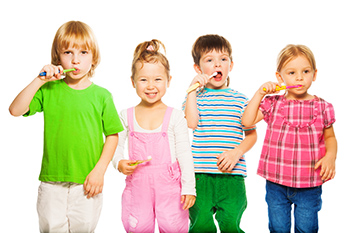Children have 20 primary, or baby, teeth, which start coming in around the age of 6 months. By the age of 3, all of the primary teeth should be present. As long as the teeth are taken care of and the child doesn’t have any trauma to the face, the teeth should start falling out around the age of 6 or 7.
Dr. Yael Kryzman and the team at Palisades Dental Care Kids in New Jersey are here to support your child’s dental health. We can help you set your child up for a lifetime of healthy teeth and gums by encouraging proper oral hygiene habits.
In this article, we’ll explain more about when you can expect your child to start losing their teeth.
When do kids lose teeth?
Children start losing their teeth around the age of 6 or 7, starting with the top or bottom central incisor. However, children as young as 4 may lose a tooth and girls are more likely to lose teeth early than boys. In some cases, a child may not lose their first tooth until the age of 8.
Why do teeth fall out, and in what order?
The reason that the 20 primary teeth fall out is to create space for the 32 permanent teeth to erupt. While this isn’t a guarantee, the average timeline for tooth loss is:
- Central incisors: between the ages of 6 to7
- Lateral incisors: between the ages of 7 to 8
- First molars: between the ages of 9 to 11
- Canines: between the ages of 10 to 12
- Second molars: between the ages of 10 to 12
How many teeth do kids lose?

Once I notice a loose tooth, how long will it take to fall out?
Once you notice a loose tooth, it shouldn’t take too much longer to fall out. However, there is no rule. It may only be a few days or it may take several weeks.
Children will naturally want to wiggle a loose tooth, but it’s important that you don’t pull it out until it’s ready. Try placing a tissue over the tooth and gently squeezing. If the tooth is ready to come out, it will. If not, leave it and try again later.
What should my child do after their tooth falls out?
When your child starts losing their teeth, it’s important to make them feel comfortable through the process. You should reinforce the importance of proper oral hygiene by:
- Encouraging and reminding them to brush their teeth twice daily
- Teaching them how to use floss or another interdental cleaning device
- Limit unhealthy, sugary snacks
- Schedule regular dental visits for exams and cleanings
The process of losing primary teeth is natural. Therefore, make it a celebration by taking pictures of their new smile and making them feel good about it.
What If My Child's Teeth Aren't Falling Out?
While most children start to lose teeth as early as age 4, some others may not start losing teeth until the age of 8. A slight delay like this falls within the parameters or normal tooth loss. However, if your child’s teeth are not falling out, it’s important to schedule a visit to the dentist to ensure that everything is okay.
If the permanent teeth are trying to come in but the primary teeth won’t fall out, the dentist may schedule extractions.
When Does My Child Need to Go to the Dentist?
According to the American Dental Association, you should start taking your child to the dentist as soon as their first tooth erupts. While this may seem a bit young for their first trip to the dentist, it offers two major benefits:
- Creates a positive relationship between the child and the dentist, reducing the risk of dental anxiety later in life.
- Assures parents that their child’s dental development is on track and prevents future issues
Keep Your Child's Smile Healthy with Regular Dental Visits
As a parent, you want what’s best for your child, which includes healthy teeth and gums for life. Therefore, you want to create a positive relationship between your child and the dentist. Schedule an exam and cleaning every 6 months at Palisades Dental Care Kids. Dr. Kryzman and the team will work with you and your child to ensure that they are comfortable.
We are located at 47 East Madison Avenue, Suite B in Dumont. Our office hours vary, with Saturday appointments available.
Children's Dental Health FAQs
If you have any questions or concerns regarding your child’s dental health, Dr. Kryzman and the team at Palisades Dental Care will be happy to address them. Below are some of the most common questions that we hear about children’s dental health.
How many teeth do kids have?
Why do kids get silver teeth?
There are several reasons that silver teeth are used for pediatric patients. The primary one is that pre-fabricated silver crowns are much less expensive than custom dental crowns. After all, since they are placed on primary teeth, they will either need to be replaced as your child grows or will fall out. Plus, they can be placed in one visit rather than requiring several.
When do kids start teething?
Babies start teething around 6 months old, with the first tooth being the lower central incisor.
How long should kids brush their teeth?
Your child should brush their teeth at least twice a day for two minutes each time. You should brush their teeth for them until they are able to do it for themselves. By teaching them good oral hygiene habits early, you set them up for a lifetime of healthy teeth and gums.


